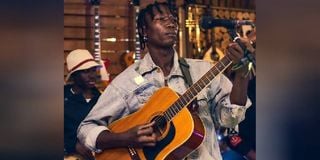The highs and the lows of staging tribute concerts

The Kavirondo Blues band perform on stage at a past event at Geco Cafe in Nairobi.
Concerts are supposed to be happy spaces where music fans go to meet and unwind as they sing along to or dance to their favourite songs. In fact, the more impressive the performances, the more concerts gain popularity.
Some of the most popular events such as Coachella — an annual music and arts festival in the United States — are memorable for these very reasons, so concert organisers have continually invested in acquiring the best acts. Historically, certain concerts have attracted such huge crowds that they have not only set trends in the art of live performance but also played significant roles in geopolitical affairs.
Most people who attend such events typically go to make merry — and yet sometimes, concerts are held under not-so-joyous circumstances, such as in the case of tribute concerts held in memory of a departed personality.
In June, friends, fans, colleagues and families of three different personalities in Kenya’s music industry came together in three different venues across three different genres of music in memory of a great trio: Eddy Ogaga, a brilliant base guitarist who played with a number of bands including Kavirondo Blues and the African Muse; Aahil Haroon, a well-known rock music fan; and Fayah Mummah Njambi, the legendary reggae MC who died earlier this month after a long battle with endometriosis.
Tribute performances can be tricky. One has to balance between portraying the timelessness of the life or art of whoever is being memorialised (without attempting to overshadow them) while still giving their best, because tribute concerts need not be pity parties.
Tribute concerts work around one main goal: to evoke nostalgia. To achieve this, most performers will recreate the work but also mannerisms and even dressing of the person being honoured. This makes tribute concerts a delicate affair because performers must delve into the person’s life.
While they can be organised for other purposes such as for charity, tribute concerts in memory of personalities are musical experiences curated to celebrate life, music and performance of the individual. The individual need not have been an artist, and rather it is enough to have been influential in some huge way. A good example is the huge concert in London to celebrate Nelson Mandela’s 70th birthday on June 11,1988 – that was also a global artistic demand for his release from prison by South Africa’s apartheid regime.
Other notable previous global tribute concerts include the 1992 Wembley Stadium concert in London held in memory of Freddie Mercury ( the genius lead singer and song composer of Queen) with 72,000 people in attendance and many more globally watching on TV; George Harrison’s memorial concert in November 2002 (later in 2004 during his tribute at the rock and roll hall of fame induction ceremony, Prince gave a stellar performance of ‘While My Guitar Gently Weeps’); Avicii Tribute concert in 2019 following sudden suicide of the Swedish DJ under the moonlight of Muscat; and the star-studded Foo Fighters’ drummer Taylor Hawkins tribute concert — both in Wembley and in Los Angeles in 2022 — in which more than 50 musicians played.
Back to Kenya, I had the chance to attend three tribute shows in June organised in memory of the three personalities and was immediately struck by the uniqueness of the shows contextualised by the different genres of music that they had embodied.
Eddy Ogaga tribute show
When Eddy Ogaga abruptly died at the start of last month, many people who had known him or worked with him felt a spontaneous desire to do something in his memory. Two days after his death, the Kavirondo Blues band announced a tribute concert dedicated to him. He was their bass guitarist.
A week later, his friends, family (a partner and a young daughter) and colleagues gathered at Two Grapes and Wine restaurant to celebrate his art.
That Tuesday evening, sitting amongst that crowd, brought together by the tragedy of death, it was clear to me that there are many kinds of goodbyes. There’s a kind of goodbye that feels like a beginning. There’s a goodbye devoid of any immediate sense of finality (unless on premonition) like kissing your child as you drop them off at school. There is the kind of goodbye for moments that can no longer be stretched further, when you have arrived at the door and the only thing left for one is to wave the final goodbye and forever walk out that door.
And then there’s the abrupt goodbyes. The goodbyes after an (unfairly) sudden departure, like death, where you slip down into the region below speech and you lack even the words to ask why them.
The Kavirondo Blues took to stage first with a long solemn solo guitar followed by sax, then bass guitar and drums just before their lead vocalist, Brian Sigu, stepped forward to give a tribute speech:
“Our fans and everybody here who have seen Eddy play with Kavirondo Blues knows he’s been a top dude in his craft,” he said. “He was a brother and he made Kavirondo Blues complete, always available whenever we needed him. It will be so difficult to replace him. Go well, brother, we will miss you.”
This is the way I remember it. From that first minute they got to the stage until they got off after performing some of their classics such as ‘Amanyi’, ‘Apuoyo’ and ‘Weke’, the crowd could barely hold back their tears. With the bass guitar toned down — perhaps, intentionally as a special tribute — and with Brian breaking into a swell of chants and cries mid performance, despair hung over the crowd like a heavy cloud.
In spite of the turbulence of their emotions, the band finished the set with ‘Kodi’ and ushered in other musicians present who had signed up for the open session such as Zawadi — who performed a solo rendition of Filah’s ‘Lemna Uru’, Nenkai, JuBlack (a rapper) and Yaba among others.
The emotional climax of the show came when The African Muse, Eddy’s other bandmates, took to stage. Emotions were high as the band delved straight into a touching rendition of Bob Marley’s ‘No Woman No Cry’ which was his favourite song. The night came to a poignant close with a quintet rendition of Les Wanyika’s ‘Sina Makosa’ sung by both Kavirondo Blues and The African Muse bands.
In all, a befitting sendoff especially since during his short tenure with Kavirondo Blues and The African Muse bands, Eddy was revered for his brilliant musicianship and charismatic personality. Afterwards, remembering, I was powerfully moved by the image of my last interaction with him: Eddy, forever frozen in a smile, at his last show, a bottle of beer in his hand, beaming as he was being teased by a bandmate.
Rock Concert in memory of Aahil Haroon
This concert was a lot of firsts for me: First time I was at a Crystal Axis concert in eight years (the last time, I had bumped into them at Alliance Francaise), first time witnessing a rock concert tribute and certainly my first time listening to a DJ’s rock version of Wakadinali’s ‘Gari Inengi’ (the famous ‘subaru ya mambaru’ song where the rapper Kitu Sewer gave us a stellar line)
Also, if you’re wondering what it sounds like — this rock version — imagine you are in a matatu heading home and your favourite song comes up in the blaring speakers. Sometimes, not often, you catch the lyrics and other times, most times, the high bass from the speakers drowns everything else.
The evening opened with a DJ set in which some of the globally popular rock songs were played (and to which the crowd sang along the lyrics word by word) — some of them known to me such as System of A Down’s ‘Toxicity’, ‘Bring me to Life’ by Evanescence, Fall Out Boy’s ‘Sugar, We’re Goin Down’ and (a favourite) Panic! At the Disco’s version of Queen’s ‘Bohemian Rhapsody,’ which was declared the greatest rock song of the 20th century, with its soaring operatic notes and immortal farewell lines like “If I’m not back again this time to-morrow, carry on, carry on … as if nothing really matters …”
This was followed by an adrenaline fuelled performance by Crystal Axis band, performing many of their hits such as ‘Leopold’ and ‘Nyayo House’, ‘Devil Sold his Soul’ and an impressive cover of Foo Fighter’s ‘The Pretender’.
Coming only four days after having attended the rather melancholic Eddy’s tribute concert, I was struck by how acutely different these rockers grieved: a scene remotely resembling My Chemical Romance’s ‘Welcome to the Black Parade’ video: Everyone in funky gothic and punk attires comprising of leather jackets, studded boots, metal chains and skeletons (having not attended a rock concert in a while, I had unwisely showed up rather plain looking), dancing while crowding as close to the stage as possible, head banging at a go almost as if there was an invisible prompt, and only taking a break from the dance floor to go drink.
Before the second band got on stage, there was a brief period of silence where Aahil Haroon’s family and friends were allowed to give tribute speeches. Aahil, the young rock fan, was not only eulogised as a lover of rock and a constant face at events but also as a warm, friendly and fun person who had left too soon. This was followed by a call to toast for Aahil while a video of him at the different rock events he attended was shown as the rock version of ‘See you again’ by Wiz Khalifa played in the background.
Immediately after, the second band, Autometal Rock Band (a duo, the bass guitarist in a pink, pig-faced mask) took over the stage a few minutes to midnight, bringing back the head-banging and the energy.
At the end of their set, the DJ took over for a karaoke session.
A reggae tribute show for Njambi Koikai

Njambi Koikai had recently appealed for a blood donation after her admission to The Nairobi Hospital.
Dubbed ‘Last salute for Fyah Mummah Njambi Koikai’, this was a tribute reggae night held at Quiver Lounge, Thika Road, by the Kenya Reggae community. It was in honour of Njambi Koikai, a reggae MC and host who passed away after a long illness.
The goal was not only to honour and celebrate the legacy of Njambi but also to raise funds towards her hospital bills and funeral expenses.
Fans and friends showed up in great numbers, among them celebrities such as Hart the Band, radio host Maina Kageni, former Nairobi Governor Mike Sonko, comedian Eddie Butita, Jacky Vike, Sandra Dacha, DJ Pierra, Frasha (of P-Unit), comedian Njugush and MC Gogo, among many others.
The venue was full to the brim and everywhere, as long as there was leg space, people were singing and dancing to popular reggae songs. Different reggae DJs present played their sets back to back. Fans showed up in reggae colours (green, yellow and red) and in jungle green as a tribute gesture.
In between performances, there were tribute speeches from different celebrities and friends with whom she had worked or interacted. At some point, candles (and lighters) were lit in her memory, after which Gravity Band and later Hart the Band performed.
Coincidentally, Njambi had died a few days away from her planned national mega concert tour to celebrate her 20 years in the reggae entertainment industry, and so in spite of the merry time the fans were having, this tribute night was not only special but was also sort of sad for the same reason.




